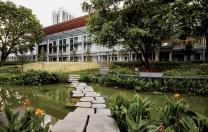Beginning in the fall of 2018, Harvard undergraduates will find themselves on a somewhat altered academic trajectory, as the revised Program in General Education takes effect. Following review of the Gen Ed curriculum that took shape a decade ago—under which students had to take one course each from eight broadly defined areas—the faculty decided in 2016 to alter its earlier handiwork. The resulting new framework requires one course each from four broad “perspectives” (Aesthetics & Culture; Histories, Societies, Individuals; Science & Technology in Society; Ethics & Civics); a distribution requirement (one course each from arts and humanities; social sciences; and sciences and engineering); and a new course demonstrating “quantitative facility” (the current definition of which, “thinking with data,” remains to be clarified, given some concerns recently raised by mathematicians—see “Pending Business: Maths”).
This segment of their education aims to “prepare students for meaningful lives of civic and ethical engagement in an ever changing world.” The faculty’s intent in defining the Gen Ed categories and devising the courses that qualify is to “help students to understand the deep relationship of scholarly work to some of the most important aspects of life beyond college. Gen Ed aims to produce practical wisdom: it asks Harvard students to consider how they will best use their liberal arts and sciences educations, and their lives, in the service of both knowledge and humanity.”
The College’s requirements thus comprise the Gen Ed courses; the distribution courses; expository writing; and learning (or testing out of) a foreign language. Alongside that architecture, the Harvard learners pursue concentrations. In any student’s progress through the College, concentration courses outnumber general-education and distribution requirements; and most ultimately aim, at least in honors fields, for focused research at some frontier of that discipline—a taste of what graduate study might entail. The rest of students’ academic work consists of whatever other electives move them and fit their schedules.
To a greater or lesser extent, that solution prevails at other liberal-arts institutions.








